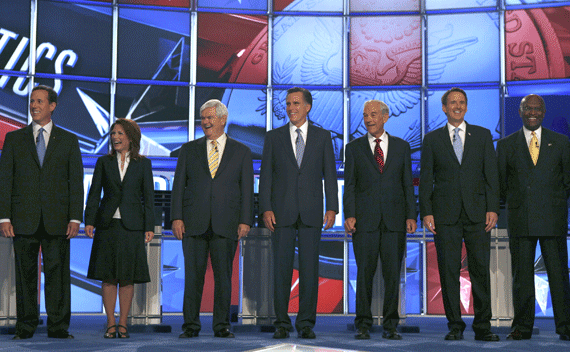The No Foreign Policy News GOP Debate
More on:

Last night’s GOP presidential debate didn’t make any foreign policy news. Indeed, unless you stuck it out until the very end, you didn’t hear much about foreign policy. By my count, the two-hour debate had entered its one-hundredth minute before the first foreign policy question was asked. And the focus on foreign policy didn’t last long. Twelve minutes later the conversation had turned to whether the current crop of GOP presidential candidates was good enough to win the White House.
For foreign-policy aficionados the problem wasn’t just a lack of time. It was also that the debate’s moderator, John King of CNN, kept changing the question. The result was a rolling series of non sequiturs. The participants largely talked about different issues, neither engaging nor rebutting their rivals.
The first foreign-policy question came from a voter (and retired Navy veteran) who asked if it wasn’t time to bring U.S. troops home from Afghanistan. Mitt Romney answered that he would bring "our troops home as soon as we possibly can, consistent with the word that comes to our generals that we can hand over the country to…the Afghan military to defend themselves from the Taliban." (Romney initially misspoke and said "hand the country over to the Taliban.") That formulation, of course, doesn’t rule much in or out. Ron Paul countered that he would not "wait for my generals. I’m the commander in chief. I make the decision. I tell the generals what to do." And what he would tell the generals is, bring the troops home now.
King then changed gears and asked Tim Pawlenty about bombing suspected al-Qaeda targets in Yemen. He was all for it. That was followed by another voter question, this time about Libya. Michele Bachman said what she has said before, "our policy in Libya is substantially flawed." Newt Gingrich tried to broaden the question to greater Middle East and said "we have got to have a totally new strategy for the region." But the former speaker didn’t have time to say what that new strategy might be. Herman Cain got a different question: how would he look at his responsibilities as commander in chief. He would start "with making sure we understand the problem." The third voter question was, shouldn’t we cut back on overseas military bases to help pay off the national debt? Rick Santorum’s answer was that we have cut bases already, we need to keep a lot of them, and we don’t need "to build bases in Germany."
That’s the sum total of foreign-policy questions. So if you wanted to know what the GOP contenders thought about issues such as the rise of China, the Arab Spring, the Israeli-Palestinian peace process, Pakistan, North Korea, Iran, climate change, defense spending, trade, or the International Monetary Fund, this debate wasn’t for you.
Is it significant that so few of the questions were about foreign policy or that the three questions from the voters were all about whether the United States should do less overseas? If the questions had been spontaneously generated, the answer would be yes. But CNN appears to have vetted the questions beforehand, so draw overarching lessons at your peril.
So there was no foreign policy news at all? Not quite. In response to a question about how to return manufacturing jobs to the United States, Pawlenty offered up a view on trade that you typically hear coming from Democratic candidates:
I understand what it’s like to see the blue-collar communities and the struggles that they’ve had when manufacturing leaves. So I’ve seen that firsthand. But number one, we’ve got to have fair trade, and what’s going on right now is not fair.I’m for a fair and open trade but I’m not for being stupid and I’m not for being a chump. And we have individuals and organizations and countries around this world who are not following the rules when it comes to fair trade. We need a stronger president and somebody who’s going to take on those issues.
Neither King nor any of Pawlenty’s rivals commented on this call for fair trade, so it’s impossible to say whether Pawlenty intends to blaze a new trail on trade.
CNN did have time for "This or That," a quick question directed to a specific candidate "to show a little bit of the personal sides of our candidates." If you who didn’t watch the debate, here are the seven questions and how each candidate answered the one that came his or her way:
Leno or Conan? Rick Santorum: Probably Leno. "But I don’t watch either. Sorry."
Elvis or Johnny Cash? Michele Bachmann: "That’s really tough. That’s really -- both, both."
"Dancing with the Stars" or "American Idol"? Newt Gingrich: "American Idol"
Blackberry or iPhone? Ron Paul: "Blackberry."
Deep Dish or Thin Crust? Herman Cain: "Deep dish."
Chicken wings: Spicy or Mild? Mitt Romney: "Oh, spicy. Absolutely."
Coke or Pepsi? Tim Pawlenty: "Coke."
You are welcome to provide your own answers to the "This or That" quiz in the comments box below. You can also weigh in with your assessments of who helped themselves the most in the debate.
More on:
 Online Store
Online Store